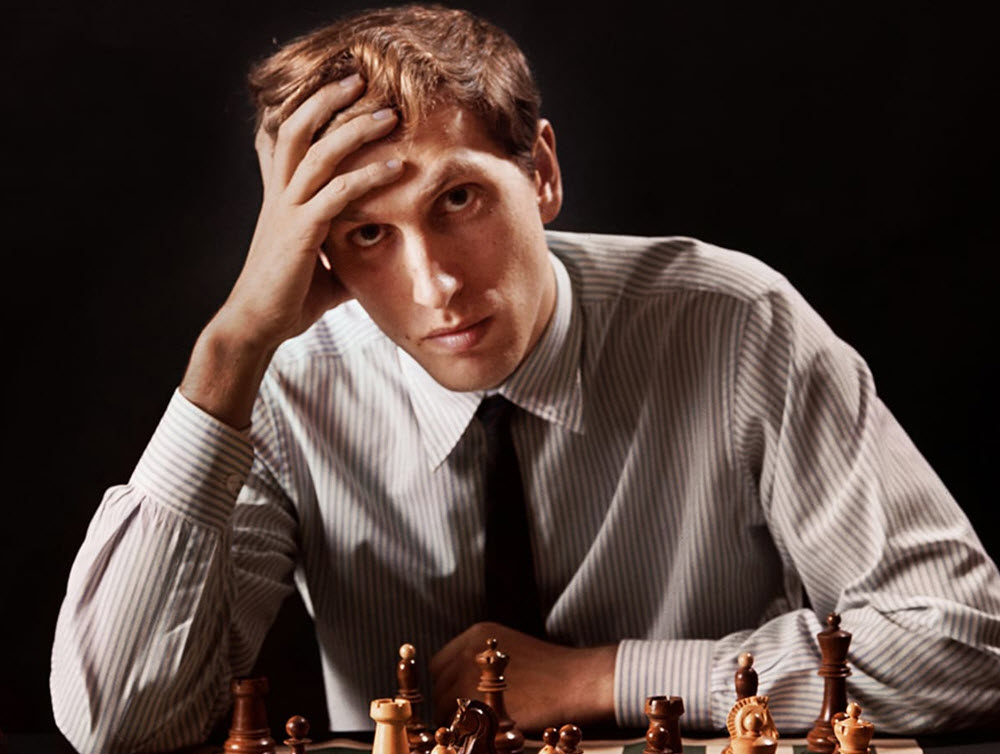Contents
Robert James Fischer (1943-2008) was the first (and so far only) World Chess Champion from the United States. He held the title from 1972 to 1975.

Childhood
Known as Bobby Fischer, this chess prodigy grew up in Chicago with his mother and older sister. Both his parents were immigrants from Europe; his father was born in Germany and his mother in Switzerland. His father moved back to Germany when Bobby was just an infant.
The family moved around quite a bit while Bobby was small, but eventually settled down in Brooklyn, New York City.
Bobby Fisher got his first chess set from his sister when he was six years old, and he quickly developed a strong fascination for the game. When he was 13 years old, he broke the record for youngest winner of the United States Junior Chess Championship. At 14, he won the United States Chess Championship (breaking the record for youngest winner) and at 15 years of age he became a Grandmaster (breaking the age record for youngest Grandmaster).
At sixteen, Fischer dropped out of school to pursue chess full-time.
Youth
In the United States, Fischer did not encounter much resistance from other players. He won eight United States Chess Champions and published two much-praised books on chess strategy.
At age 20, Fischer won the 1963/64 US Championship with 11 wins in 11 games – the only perfect score in the history of the tournament.
Fischer also developed a reputation for being eccentric, paranoid and overly fond of humiliating his opponents. A famous quote from him reads ”I like the moment when I break a man´s ego”. He was also unreliable in his relationships with tournament organizers, as it was not unusual for him to suddenly pull out of tournaments. Despite having Jewish ancestry, Fischer became an outspoken anti-Semitic in this 20s.
In 1970, Fischer won the Interzonal Tournament by a record-breaking 3 ½ point margin. He also won 20 games in a row during the last seven rounds of the Interzonal and in the Candidates Matches.
When FIDE published their first official ratings in July 1971, Fischer was the top-rated player by a wide margin.
World Championships in Reykjavik
When Bobby Fischer and Boris Spassky played against each other in the 1972 World Chess Championships in Iceland, it was largely viewed as a contest not just between two chess players but also between the United States and the Soviet Union. This was during the Cold War, and the match quickly became saturated with national prestige from both sides.
Fischer´s 1972 championship win broke a long series of Soviet Union wins. Not since Alexander Alekhine held the title in 1937-1946 had the World Chess Champion not been a Soviet Union player. (Notably, Alekhine migrated from the Soviet Union to France in 1921.)
In 1975, Fischer refused to defend his championship title as he and FIDE could not come to an agreement regarding certain conditions for the match. As per FIDE rules, this resulted in Anatoly Karpov being crowned world champion by default, as he has won the qualifying Candidates´cycle.
Aftermath
After his 1972 World Championship win, Fischer stopped playing publicly. One notable exception was the unofficial match between him and Spassky held in 1992, twenty years after the championship match. This match, which was won by Fischer, took place in Yugoslavia. Yugoslavia was under a United Nations embargo at the time, and US sanctions had been imposed through an executive order. After the match, the US government issued a warrant for Fischer´s arrest, prompting Fischer to a life in exile.
In 2004, Fischer was arrested in Japan after using a revoked US passport. Fischer was eventually granted Icelandic citizenship and passport by a special act of the Icelandic Althing.
Fischer chess timing
In the 1990s, Fischer patented a modified chess timing system that is now the standard choice for top tournaments. With the Fischer system, a time increment is added after each move.
Fischer random chess
Fischer launched his invention Fischer random chess (also known as Chess960 and Chess9LX) in Buenos Aires, Argentina in 1996. This is a chess variant where the initial position of the pieces is randomized to one of 960 possible positions, following certain rules.
Proponents of Fischer random chess typically enjoy its emphasis on talent and creativity. With piece positions being randomized at the beginning of the game, it is not much of an advantage to have memorized traditional openings.
Fischer is not the inventor of random chess; it has existed for a long time and is commonly known as shuffle chess. What is special about Fischer random chess is the rules for the initial random setup, which makes it not completely random.
In 2008, FIDE added Chess960 to an appendix of the Laws of Chess. The first FIDE World Fischer Random Chess Championship took place in 2019.
